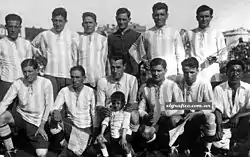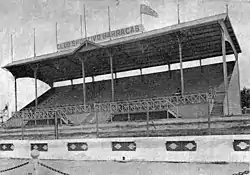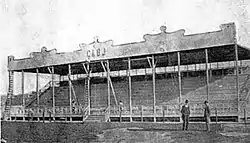1925 South American Championship
The ninth South American Championship was held in Buenos Aires, Argentina from 29 November to 25 December 1925.
| Tournament details | |
|---|---|
| Host country | Argentina |
| Dates | 29 November – 25 December |
| Teams | 3 (from 1 confederation) |
| Venue(s) | 2 (in 1 host city) |
| Final positions | |
| Champions | |
| Runners-up | |
| Third place | |
| Tournament statistics | |
| Matches played | 6 |
| Goals scored | 26 (4.33 per match) |
| Top scorer(s) | (6 goals) |

In 1925, the participating countries were Argentina, Brazil, and Paraguay. Chile and Uruguay withdrew from the tournament, making this event the one with the fewest participating teams.[1] The tournament was rescheduled to be held in two rounds.
Argentina won its second continental title.[2]
Squads
For a complete list of participants squads see: 1925 South American Championship squads
Venues
| Buenos Aires | |
|---|---|
| Sportivo Barracas Stadium | Estadio Ministro Brin y Senguel |
| Capacity: 30,000 | Capacity: 25,000 |
 |
 |
Final round
Each team played two matches against each of the other teams. Two points were awarded for a win, one point for a draw, and zero points for a defeat.
| Team | Pld | W | D | L | GF | GA | GD | Pts |
|---|---|---|---|---|---|---|---|---|
| 4 | 3 | 1 | 0 | 11 | 4 | +7 | 7 | |
| 4 | 2 | 1 | 1 | 11 | 9 | +2 | 5 | |
| 4 | 0 | 0 | 4 | 4 | 13 | −9 | 0 |
| Brazil | 5–2 | |
|---|---|---|
| Filo Friedenreich Lagarto Nilo |
Rivas |
| Paraguay | 1–3 | |
|---|---|---|
| Fleitas Solich |
Tarasconi Seoane Irurieta |
Result
| 1925 South American Championship champions |
|---|
Argentina Second title |
Goal scorers

6 goals
4 goals
2 goals
.svg.png.webp) Arthur Friedenreich
Arthur Friedenreich.svg.png.webp) Gerardo Rivas
Gerardo Rivas
1 goal
 Antonio Cerrotti
Antonio Cerrotti Alfredo Garasini
Alfredo Garasini Juan C. Irurieta
Juan C. Irurieta Martín Sánchez
Martín Sánchez Domingo Tarasconi
Domingo Tarasconi.svg.png.webp) Filo
Filo.svg.png.webp) Manuel Fleitas Solich
Manuel Fleitas Solich.svg.png.webp) Luis Fretes
Luis Fretes
Aftermath
Despite having won the tournament unbeaten, part of the Argentine media considered the team's performance as "poor", highlighting that Argentina was the winner only because of being stronger than the other two participants. Argentine magazine El Gráfico stated Argentina's virtues were decreasing as the competition went by, with such notable failures.[3]
Centre forward Juan Carlos Irurieta was injured in the first match, being replaced by Manuel Seoane, who did not play as good as he used to be because of his change of position (from left insider to centre forward). The media criticised hardly the performances of Garasini, Alejandro de los Santos, Antonio Cerrotti and Juan Bianchi. On the other hand, Domingo Tarasconi, Seoane and Martín Sánchez were mentioned as the most remarkable players. In the case of Tarasconi, his efficient dribbling, passing style and accurate corner kicks were widely praised. Seoane's goalscoring prowess was also mentioned as one of the high points of Argentina, setting a record with six goals in four matches. Nevertheless, Seoane was also criticised for being out of shape due to his overweight.[3]
Another Argentine player harshly criticised was goalkeeper Américo Tesoriere:
(Tesoriere) is not the "magician of the goal" that we admired so much due to his security, courage, cold blood, surprising agility and unsurpassed sense of location. Although the rival did not attack so much, he conceded four goals, which were not hard-to-stop shots. Apart from the goals received, Tesoriere's showed himself insecure and slow, which could have been worse. Undoubtedly, we don't mean that his performance was disastreous, but we do want to set he is having a tough time in his sports career either his debacle is approaching...
— El Gráfico, about Américo Tesoriere's performance at the South American Championship
References
- Elsey, Brenda (1 July 2011). Citizens and Sportsmen: Fútbol and Politics in Twentieth-Century Chile. University of Texas Press. ISBN 9780292744714. Retrieved 4 March 2017 – via Google Books.
- South American Championship 1925 at RSSSF
- 1925. Argentina conquista su segundo Sudamericano, El Gráfico